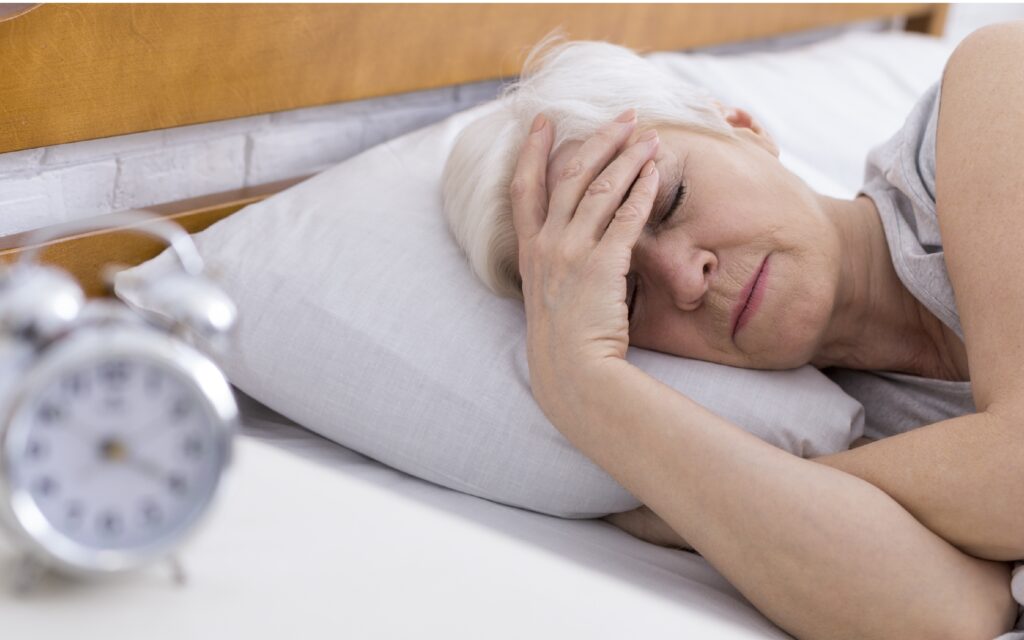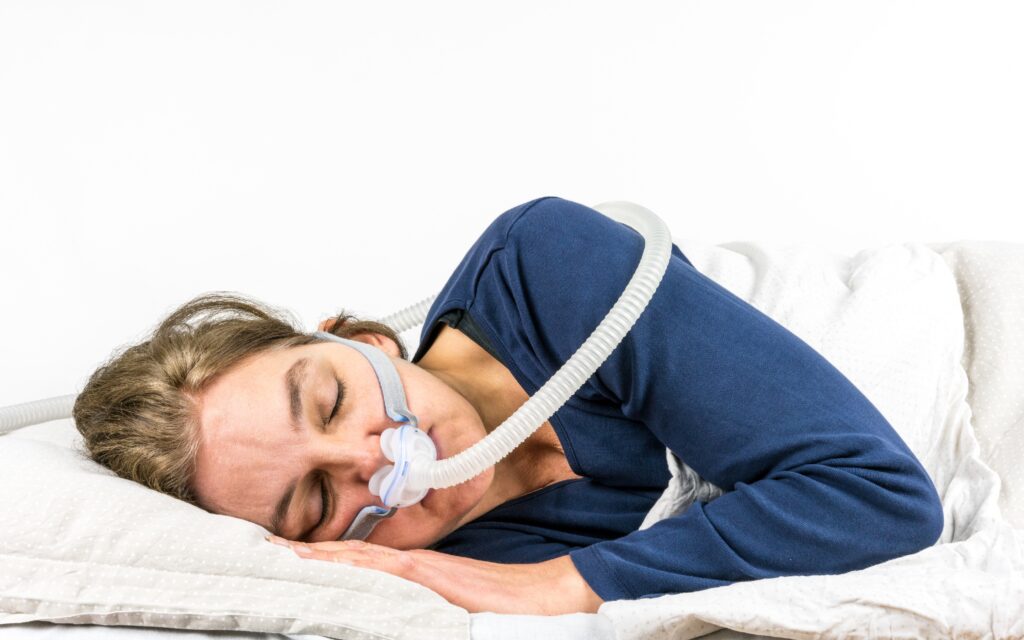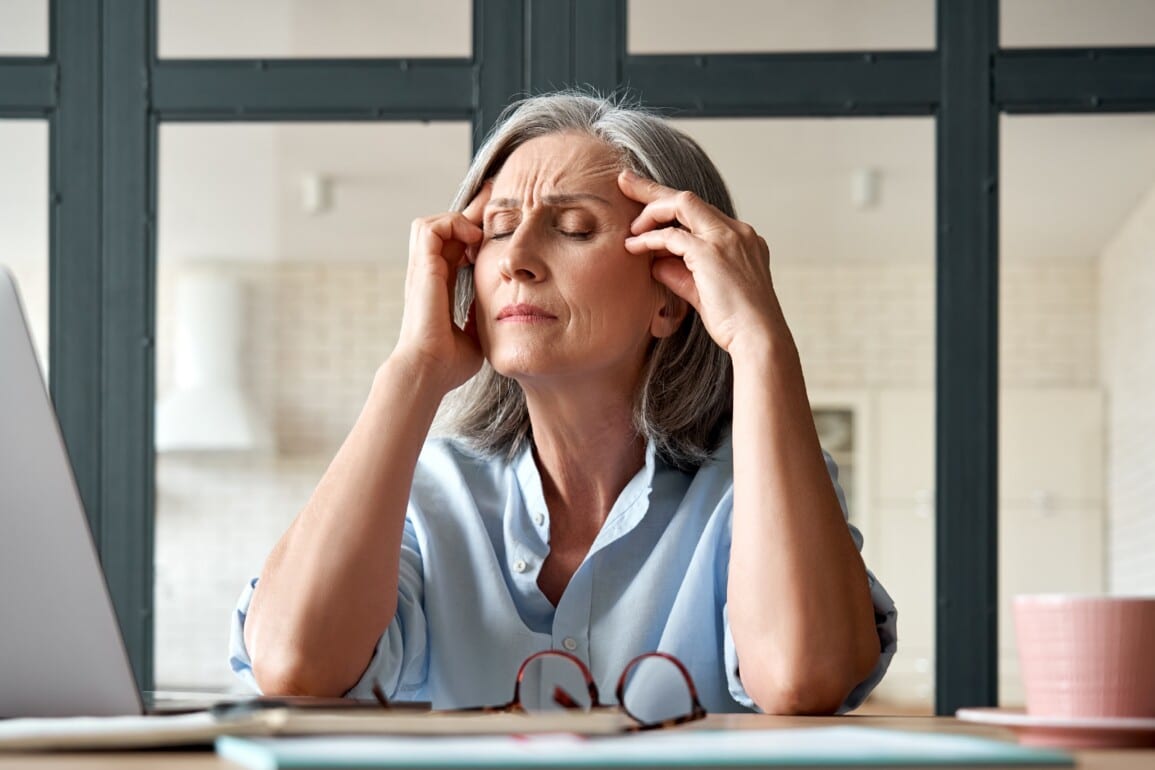Sleep apnea and menopause symptoms may have a closer connection than you’d think. Most people asked to imagine the average person with sleep apnea would usually picture a man, as women are notoriously underdiagnosed in this area. Despite this, almost one in two sleep apnea patients are women, indicating a nearly identical level of risk. Today we’re going to explore menopausal sleep problems such as poor quality sleep, snoring and sleep apnea.
There are many reasons why sleep apnea appears to be less commonly diagnosed in women. From embarrassed ladies being too nervous to talk to the doctor about their snoring habits, to a difference in symptoms between the genders.
However, like men, women should be aware of the risks of sleep apnea, and what to do if they begin experiencing signs.
This is particularly true at certain points in a woman’s life, such as during pregnancy, and during menopause. In fact, studies are beginning to explore whether menopause and sleep apnea could be intrinsically linked.
Diagnosing sleep apnea in women
Women are generally seen as less prone to sleep apnea than men, but they’re still at risk. Around 2% of women currently suffer from obstructive sleep apnea, according to the American Academy for sleep medicine. The rate of diagnoses is exceptionally low, though.
Historically, sleep apnea was considered to be an affliction mostly for men, and only rarely for women. Part of the reason for this is the difference in symptoms between a man and women.
Women are less likely to report loud, chronic snoring – one of the more common signs of sleep apnea. The breathing problems they experience during sleep can also be more subtle, and less likely to wake their partners. Women are also more likely to report symptoms which can apply to a range of conditions outside of sleep apnea, such as:
- Lack of energy
- Fatigue
- Insomnia
- Headaches
- Restless leg syndrome
- Depression
- Mood changes
Some experts also note women are more likely to receive prescription medications for sleep problems. They might get antidepressants, rather than being asked to take a sleep study for testing. Commonly, sleep apnea in women is misdiagnosed as depression, anemia, hypertension, and a host of other conditions. It can even be explained away by the hormonal changes happening during menopause.

Sleep problems in menopause: Sleep and menopause
Menopause is the name used to describe the absence of menstrual periods in a woman for 12 months, marking the end of her fertility. This occurs when a woman doesn’t produce the hormones estrogen and progesterone as she once did.
Usually, the average onset age for menopause is around 51, but it can start as early as 40, or as late as 55. Most women start the menopause at a similar time to other women in their family. It’s common for women to experience a very poor sleep quality during this change.
Is sleep apnea a symptom of menopause?
Studies indicate a woman’s risk of sleep apnea increases significantly following the menopause. In general, the higher levels of estrogen and progesterone in a woman before menopause can protect her from the early onset of sleep apnea.
These hormones maintain the muscle tone of the airways in your body, and prevent them from collapsing, common in obstructive sleep apnea.
As a woman’s hormone levels begin to change during perimenopause, incidents of sleep apnea become increasingly common. One study found the prevalence of moderate to significant obstructive sleep apnea increased from only 0.6% for those aged 20 to 44, to 2% for those aged 45 to 64, and 7% for anyone aged 61 to 100.
A type of estrogen called estradiol decreases at menopause, and it is responsible for body weight and metabolism regulation. Notably, a lack of estrogen can lead to other issues which may increase your risk of snoring and sleep apnea, such as weight gain. People with sleep apnea are more likely to be overweight and obese.
This doesn’t necessarily mean menopause causes sleep apnea, but it does increase the likelihood of a woman experiencing the condition. Unfortunately, it’s often difficult for women to get the diagnosis and treatment they need to overcome sleep apnea.
Menopause and snoring: The issues with the apnea diagnosis
As mentioned above, it’s notoriously more difficult to diagnose sleep apnea in women than it is to detect the condition in men.
In the transition into menopause studies show significantly more complaints of snoring and altered breathing during sleep.
Although doctors are aware the risk of sleep apnea is higher during menopause, the symptoms of sleep apnea can sometimes overlap with common symptoms of the menopause. Some of these symptoms include:
- Weight gain or weight changes
- Joint or muscle pain
- Osteoporosis
- Lost muscle mass
- Decreased sexual interest
- Mood changes or swings
- Vaginal and urinary problems
- Hot flushes
- Irregular periods
- Trouble sleeping and poor sleep quality
- Night sweats and restless legs syndrome
- Poor concentration and memory loss
- Fatigue or daytime sleepiness
Many of these symptoms occur with both sleep disorders and the menopause, making it harder for women and doctors to distinguish whether they’re experiencing the natural outcomes of the menopause, or something else.
Fortunately, doctors are currently engaging in new studies and getting further education on the prevalence of sleep apnea in women, particularly during certain periods of their lives. Women also need to be aware of the risk factors of OSA, and the importance of seeking assistance and therapy as quickly as possible.

The challenge of menopause and sleep apnea
Menopause alone can be an exhausting and overwhelming experience for a lot of women. The addition of sleep apnea can make the experience even worse. It’s important to ensure you’re getting the right treatment to help minimize your discomfort.
Even if you’re not aware of your snoring issues, or waking during the night, the fragmented sleep you get can lead to many problems, including mood swings, daytime sleepiness, and more. Loss of muscle tone and weight gain, which are both common as you get older, can also make your sleep apnea risk a lot worse.
Does HRT help sleep apnea?
Hormone replacement therapy can improve your chances of avoiding sleep apnea. This is shown in studies wherein people on HRT were less likely to experience sleep apnea than older women not taking hormone replacement. However, you’ll still be at a slightly higher risk of suffering from sleep apnea if you’re on hormone replacement therapy.
Additional treatment may be necessary to address sleep problems in menopause, including the use of a CPAP machine. Changes to a person’s lifestyle can make a difference, if things like obesity and smoking are increasing their risk of collapsing airways.
Even if you aren’t sure whether you’re experiencing the symptoms of sleep apnea, it may be worth speaking to a doctor if you have one of the following risk factors:
- Women over the age of 55: Women over the age of 55 are 14% more likely to have severe OSA, and women in menopause have a higher risk too.
- You’re overweight: Obese women over the age of 50 are 31% more likely to have OSA.
- You’re experiencing depression or anxiety: Women are more likely to develop co-morbid conditions like depression and anxiety with sleep apnea.
- You have polycystic ovarian syndrome: The risk for developing OSA among women with PCS can be up to 70%.
Remember, the menopause isn’t the only time when a woman can be more prone to sleep apnea either. Pregnancy can also increase your risk of developing OSA. Untreated sleep apnea in pregnant women can increase your risks of complications during pregnancy, like pulmonary blood clots, high blood pressure, and other issues.
Does sleep apnea go away after menopause?
Ultimately, after menopause when you’re producing less estrogen and progesterone, your sleep apnea risk will increase significantly. Your risk level is highest when you’re on no hormone replacement therapy at all – often later in life. This means it’s important to be aware of any symptoms which may indicate the presence of sleep apnea.
If you’re concerned about snoring, fatigue, or changes to your weight and mood, don’t assume it’s just a side effect of the menopause. Sleep apnea and menopause issues often go overlooked because women assume they’re just suffering from the changes happening in their body due to a drop in certain hormones. However, it can be helpful to look into extra investigation.
Speaking with a healthcare provider and having a sleep studio organized will mean professionals can actively examine your sleeping state and determine whether it is sleep apnea causing your symptoms, or something else entirely. If sleep apnea is the problem, additional treatment can be available to help make your condition more manageable.
Menopause shouldn’t be more difficult than it needs to be with the addition of sleep apnea.
Siestio. Sleep matters.
Medical disclaimer
You must not rely on the information provided on our website as an alternative to medical advice from your doctor or other healthcare professionals. For more information read our full disclaimer here.
Now read these:
The connection between libido and sleep apnea
The role of nightmares in sleep apnea







